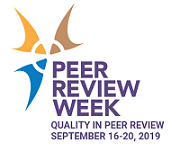
Johns Hopkins UniversityEst. 1876
America’s First Research University
On the Occasion of Peer Review Week

I have to admit that I’m new to the celebration of Peer Review Week, now in its fifth year, but not new to peer review or the concept of Quality that’s the focus of this year’s observance. I have always held great respect for the process of peer review and those who give of their time to examine a colleague’s publication. Peer review is an honored tradition, an effective method to objectively reflect on and evaluate another’s work in the interest of improvement. The process offers a constructive exchange and the opportunity to think critically about our work, from a relatively unbiased source. It’s not perfect, but it does work.
I view and value the peer review process from three perspectives: as a professional – a physician seeking continued education, as an author seeking respect and affirmation from colleagues, and as a clinician advising, guiding and educating patients, including recommending books. While there are other sound sources of information, it takes more time and effort on the reader’s (my) part to make that determination and analyze the methods, data, results and conclusions in a published non-peer-reviewed work. And in an era where anything can be posted online or self-published, we become responsible to check our sources of information with a critical eye. Not all are well done and reliable.
Peer review matters because it’s a way to validate one’s handiwork from within the field, coming from respected colleagues, which then becomes meaningful. Peer review also matters because authors want to reach their readers, to be trusted by them. In addition, readers cannot possibly authenticate everything they read – that is unrealistic. Thus, a process was born.
The majority of reviews are done as single- or double-blinded reviews that allow for impartial decisions without undue influence or bias. In my professional reading, I have greater confidence in a publication that has been peer reviewed, and trust that the best effort has been made to provide quality content. I’ve been on both sides of the equation, as a grateful author and a humbled and meticulous reviewer, and have found those experiences to be immensely gratifying.

The peer review process is a way of ensuring the quality of a published journal article or book. What do we mean by quality, and how is this done? Quality in Peer Review can be thought of as understanding the needs and meeting (or exceeding) the needs or expectations of the interested parties. Readers expect that a manuscript will be accurate, and that any concerns, deficiencies, discrepancies, misinterpretations or conclusions have been identified and addressed so that the end result will be reader confidence (not necessarily agreement) in the material. Authors expect this to be a fair, impartial and professional process. Reviewers expect anonymity and personal and professional respect.
Allow me to share with you my experiences in peer review. As an author, I highly value the time and effort spent by others in improving my published works through their thoughtful evaluation and feedback. I’ve found the reviewers’ comments to be helpful contributions to the betterment of my piece, which I greatly appreciate. Any questions posed or clarifications requested were a welcome relief – they caught any areas of potential uncertainty before my books were released to the public, and for that I was indebted. While mine have all been anonymous reviews, I still felt obliged to send a blinded thank you note in return for my first, very generous book review! Seems trite, but it was the least I could do.
As a reader/reviewer of book proposal submissions and journal articles, I felt honored to be asked. My view of the assignment was to safeguard high quality, relevant and scientifically valid content, and I took that quite seriously. Common sense played a big part, as did the standard of care, generally accepted medical knowledge and decision making. What I did not know, I sought out. After all, I was a consultant giving my professional opinion to the publisher who had a stellar reputation that I intended to maintain.
The first “negative” review I submitted was fraught with a bit of anxiety on my part. This was on a topic I knew well, and I spent a long time thinking about it from different perspectives. It was a single-blinded review, the author was well known, and I wondered if perhaps the editors were aware of something about this manuscript proposal that had escaped me. It was satisfying to discover that all along, in their gut instinct, they had silently agreed with me and my decision and were looking for an independent peer confirmation from me. This is the process.
So, let’s commend those who make this grand effort in quality and act as the safety net for their peers’ publications. We are all better off because of them.
Susan J. Noonan, MD, MPH, a part-time Certified Peer Specialist at McLean Hospital, is a consultant to Massachusetts General Hospital and CliGnosis, Inc. She is the author of multiple books published by Johns Hopkins University Press, including Take Control of Your Depression: Strategies to Help You Feel Better Now.
This post is part of our celebration of the fifth annual Peer Review Week, with the theme “Quality in Peer Review”. Come back each day for insight from one of our book authors into the role of peer review in their work.



